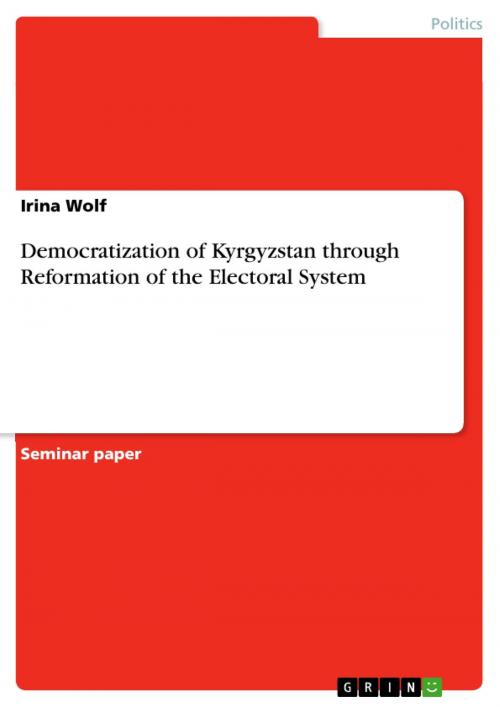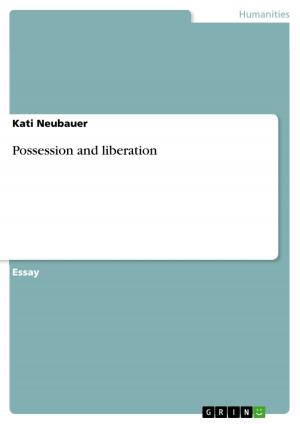Democratization of Kyrgyzstan through Reformation of the Electoral System
Nonfiction, Social & Cultural Studies, Political Science| Author: | Irina Wolf | ISBN: | 9783640371389 |
| Publisher: | GRIN Publishing | Publication: | July 10, 2009 |
| Imprint: | GRIN Publishing | Language: | English |
| Author: | Irina Wolf |
| ISBN: | 9783640371389 |
| Publisher: | GRIN Publishing |
| Publication: | July 10, 2009 |
| Imprint: | GRIN Publishing |
| Language: | English |
Seminar paper from the year 2006 in the subject Politics - International Politics - Region: Russia, grade: A, OSCE Academy, course: Electoral Systems and Political Parties, language: English, abstract: Given the fact that none of the international declarations, conventions or covenants establishes a type of electoral or party systems, which is more democratic than others, it is a sole prerogative of a sovereign state to decide, which system to follow - majoritarian, proportional representation, mixed, or any other - while starting or continuing the process of democratization. The problem is that incumbent politicians can manipulate the electoral system in such a way as to ensure victory during next elections to preserve their power. Kyrgyzstan is precisely such a case. Although, during 14 years of country's independence the electoral system has undergone major transformations three times, the current electoral system can hardly be named democratic. Furthermore, after the Kyrgyz opposition took over power on 24th March, 2005, one of the first requirements of the civil society was revision of the constitution, including reformation of the electoral system. Having come across The New International IDEA Handbook on Electoral System Design, it became increasingly interesting for me to make an attempt to design the electoral system for Kyrgyzstan to make it more democratic. Apart from using the handbook on Electoral System Design, the methods of research include analysis of reports of international organizations such as OSCE and ICG related to the topic. Hypothesis of the author is the following. In order to 'democratize' Kyrgyzstan, i.e. to make the decision-making process more inclusive, to ensure that majority of voices is heard, and to secure that regional, clan and minorities' interests are taken into account, it is necessary, inter alia, to introduce Parallel electoral system, i.e. half of the seats in the parliament is to be elected by FPTP run-off in single-member constituencies while the other half of the seats is to be elected by PR closed party lists.
Seminar paper from the year 2006 in the subject Politics - International Politics - Region: Russia, grade: A, OSCE Academy, course: Electoral Systems and Political Parties, language: English, abstract: Given the fact that none of the international declarations, conventions or covenants establishes a type of electoral or party systems, which is more democratic than others, it is a sole prerogative of a sovereign state to decide, which system to follow - majoritarian, proportional representation, mixed, or any other - while starting or continuing the process of democratization. The problem is that incumbent politicians can manipulate the electoral system in such a way as to ensure victory during next elections to preserve their power. Kyrgyzstan is precisely such a case. Although, during 14 years of country's independence the electoral system has undergone major transformations three times, the current electoral system can hardly be named democratic. Furthermore, after the Kyrgyz opposition took over power on 24th March, 2005, one of the first requirements of the civil society was revision of the constitution, including reformation of the electoral system. Having come across The New International IDEA Handbook on Electoral System Design, it became increasingly interesting for me to make an attempt to design the electoral system for Kyrgyzstan to make it more democratic. Apart from using the handbook on Electoral System Design, the methods of research include analysis of reports of international organizations such as OSCE and ICG related to the topic. Hypothesis of the author is the following. In order to 'democratize' Kyrgyzstan, i.e. to make the decision-making process more inclusive, to ensure that majority of voices is heard, and to secure that regional, clan and minorities' interests are taken into account, it is necessary, inter alia, to introduce Parallel electoral system, i.e. half of the seats in the parliament is to be elected by FPTP run-off in single-member constituencies while the other half of the seats is to be elected by PR closed party lists.















